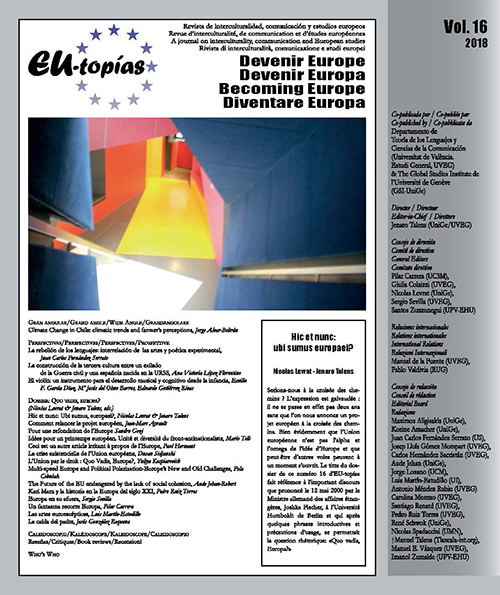Union by Law: Quo vadis, Europe?
DOI:
https://doi.org/10.7203/eutopias.0.18366Keywords:
oschka Fischer, European Union, European law, sharing of skills, EU and State-members Abstract
Abstract
The European Union is based on the principle of attribution of powers, sharing the sovereignty between Europe and the States-Nation. This principle was intended to ensure that most powers could be exercised as close as possible to the citizens. What happens in the EU is just the opposite. Not only do we do not have a Constitutional Treaty, but the border between the competences of the Union and those of its Member State-Members is very vague and shifting. We are witnessing an increase in EU competences at a horizontal level, between European institutions and national institutions, and at a vertical level, ever-increasing material competences are exercised at European level. This is a problem since the first victims are the citizens. This increase in the powers of the Union is to the detriment of democracy in Europe. Hence, unsurprisingly, the national retreat, the populism and the reflections around the European democratic deficit.
 Downloads
Downloads
 References
References
Piarovich, Yuliya (2017): « L’opposition wallonne au CETA ramène le débat plus proche du citoyen européen» : https://blogdroiteuropeen. com/2017/01/09/lopposition-wallonne-au-ceta- ramene-le-debat-plus-proche-du-citoyen-europeen- par-yuliya-kaspiarovich/.
Kleimann, David (2017): “The transformation of EU external economic governance: law, practice, and institutional change in common commercial policy after Lisbon”, PhD thesis defended in 2017 at the EUI, Florence.
Levrat, Nicolas (2012): “La construction européenne est-elle démocratique”, La Documentation française. levrat, Nicolas: “The Legal Dimension of the Theoretical Implications of Supranationality versus Legitimacy or Supra- national Law shortcomings: a Legal Perspective”, in “The Supranational at Stake?”, (on-going publication, not yet published)
Post, Robert (2010): “Constructing the European Polity: ERTA and the Open Skies Judgments” in “The Past and the Future of EU Law”, MP. Maduro and L. Azou- lai, pp. 234-247.
Sarmiento, Daniel (2018): “Judicial Infringements at the Court of Justice – A brief comment on the phenomenal Commission/France (C-416/17)”: https://despiteou- rdifferencesblog.wordpress.com/2018/10/09/ judicial-infringements-at-the-court-of-justice-a- brief-comment-on-the-phenomenal-commission- france-c-416-17/.
Vauchez, Antoine (2013): « L’Union par le droit », Les Presses de Science Po.
Weiler, Joseph H.H. (1991): “The Transformation of Europe”, The Yale Law Journal, Vol. 100, No. 8, pp. 2403-24-83.
Weiler, Joseph H.H. (1994): “A Quiet Revolution : The European Court of Justice and its Interlocutors”, Compar- ative Political Studies, Vol. 26, No. 4, pp. 510-534.
Downloads
Published
How to Cite
-
Abstract215
-
PDF (Français )58
Issue
Section
License
![]()
The authors conserve the copyright. All content published in EU-topías. Journal of interculturality, Communication, and European Studies are subject to the license Creative Commons Attribution-NonCommercial-ShareAlike 4.0 license. The full text of the license can be found at <http://creativecommons.org/licenses/by-nc-sa/4.0>
They may be copied, used, disseminated, transmitted and publicly displayed, provided that:
- The authorship and original source of the publication is cited (journal, publisher and URL of the work).
- They are not used for commercial purposes.
- The existence and specifications of this license of use are mentioned.
It is the responsibility of the authors to obtain the necessary permissions for images that are subject to copyright.



